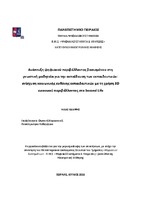Ανάπτυξη ψηφιακού περιβάλλοντος βασισμένου στη γνωστική μαθητεία για την εκπαίδευση των εκπαιδευτικών : ενίσχυση κοινωνικής ευθύνης εκπαιδευτικών με τη χρήση 3D εικονικού περιβάλλοντος στο Second Life

View/
Keywords
Εικονικά περιβάλλοντα ; Επαγγελματική ανάπτυξη ; Κοινωνική ευθύνη ; Εκπαιδευτικοί ; Second Life ; Virtual environments ; Professional development ; Social responsibility ; TeachersAbstract
The role of a teacher at school should not be limited to the transmission of
knowledge, but should be a source of inspiration for students and should provide
them with ideas and values useful for their lives. A teacher that has social
responsibility can transmit the relative values to its students, via his daily lifestyle
and social actions (Sihem, 2013).
A social responsible person attempts to have a positive effect on all human beings,
the environment and society that he lives (Vanasupa et al., 2006). Social
responsibility is not limited in avoiding actions that may have negative impact on
others, but extend to taking actions that aims to help and support other people
(Canney & Bielefeldt, 2015).
A relative new trend in education is the use of virtual environments having as main
purpose to design educational activities that realistic simulates real life events
(Molka-Danielsen et al., 2012). However, the use of virtual environments has not yet
been extended in order to support professional social development of users
(Gregory et al., 2014).
This study examines the possibility of enhancing social responsibility (social
development) for teachers with the use of the virtual environment of Second Life. As
part of this study a virtual environment has been developed related to the action of
Doctors without Borders and to support users to learn how to provide first aid. The
design of the relevant virtual environment is based on the theory of cognitive
learning and includes role-play activities. Moreover, the activities and design of
virtual environment incorporates elements - attributes of practices that are
considered likely to enhance the social responsibility of individuals.
With the use of relevant questionnaires that have also been used by others
researchers examining relevant issues, in order to assess the designed virtual
environment and potential differentiation in social responsibility for participants.
Moreover, by personal observation and recording of messages between participants
during the educational intervention, the effectiveness of virtual world’s design and
of activities within the virtual environment are assessed.
Finally, the conclusions of the present study are presented, related to the ability of
using virtual environments for the enhancement of social responsibility to primary
school teachers and potential limitations of the current research are presented.


